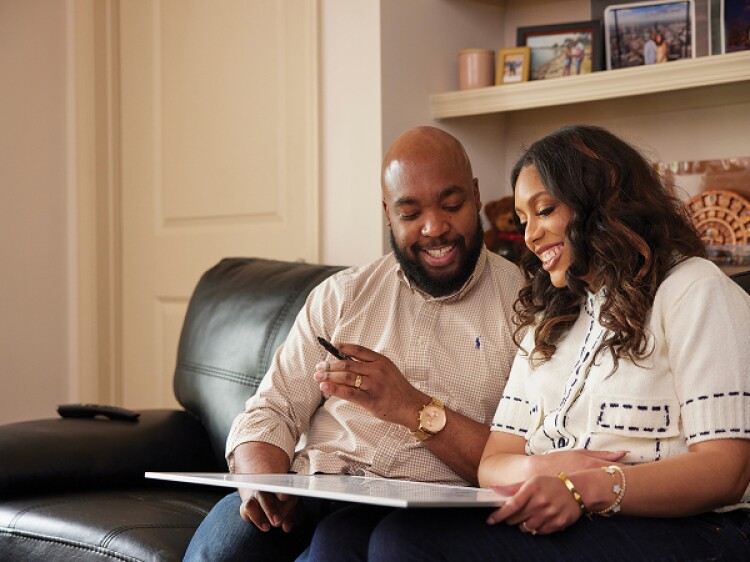Have you ever gone through a maze, traversing through those unexpected twists and turns that can make you wonder if you’ll ever find your way out?
Talking about money with your partner, whether you’ve been together a few years or decades, may feel a little bit like walking through a maze. You may find yourself feeling a little lost or frustrated as you navigate family history, differences in saving and spending habits, and perhaps even mismatched financial goals.
“It’s a challenge that’s unique to each couple,” says William Leach, Thrivent financial advisor in Lebanon, New Jersey. “Oftentimes, how money was discussed or modeled when you were growing up plays a key role. It can be a sensitive topic, but it’s also crucial that couples get on the same page.”
The best way to get through the financial maze—no matter the stage of your relationship—is

The early years: Building a foundation
For Hal and Alieyyah McKinley of Fairfax, Virginia, money management is an ongoing and collaborative effort. The couple met at Hampton University 10 years ago, and after graduation, they dated long distance before getting married in 2021.
Their
While both brought student debt from their bachelor’s and master’s degrees into the marriage, the couple learned early on to navigate as a team, given that each person came into the marriage with their own individual contributions.
“It could have been an issue,” Alieyyah says “But the way we navigate as a team, it’s all hands on deck.”
Alieyyah appreciates how she and Hal educate and balance each other out. She credits their early money conversations with helping her save. “We naturally helped each other grow,” she says. “We present our values rooted in our faith and try to be sure we’re doing God’s will.”
Last year, the couple chose to focus on delayed gratification as they explored how to wisely use their money. Hal points to Matthew 6:19-21 and the couple’s desire to store up their treasures in Heaven. “We don’t want to spend money on the frivolous,” Hal says.
The couple meets at least once a quarter to talk through their
And they try to be transparent. “If the credit card spikes up, neither of us has an issue asking the other about what it’s for,” Hal says.
The McKinleys, who are in their early 30s, also look to the future. “We talk about the long game, about how to save for retirement,” Alieyyah says. “Do we buy the dream house today or stay in what we can afford? How do we focus on being content in this season of life in preparation for the next?”
Early in their marriage, the McKinleys had a grease fire in their condo. They were displaced for months. “There was so much uncertainty,” Alieyyah says. “It was the unknown of how that would impact us financially.”
Gratefully, they had insurance to help with the financial aspects. But they also knew they had to stay rooted in their faith and with each other, Alieyyah says, building the other up and ensuring they always felt loved. It became a time of growth for the couple—with each other, in their faith and in their greater community of family and friends.
“Mistakes often teach us better lessons,” Hal says. “There will be ups and downs along the journey, but we’re still on the same team.”
- Create a financial strategy together. Meet regularly to discuss goals, challenges and victories.
- Ask questions, and don’t make assumptions.
- Listen to the other, not to respond but to seek to understand. Be ready to compromise.
- Focus on saving more and spending less; protect your assets.
- Always remember that you’re a team.

Since they retired in 2023, Dave and Cindy Allen’s money conversations tend to be about their
The Allens admit that they rarely talked about money. Cindy, with help from Dave in different seasons of their life together, balanced the checkbook and monitored the couple’s income and expenses. They didn’t have a
“We just naturally didn’t spend money on things that weren’t necessary or reasonable,” Cindy says.
The Allens, college sweethearts, have been married 46 years. They met at the University of Kansas in 1977 and married the following year, just before Dave started his junior year. With college debts and needing to balance payments for insurance and monthly household expenses, Cindy put her own education on hold (she later earned her bachelor’s degree) and worked full-time at a local hospital.
Dave’s jobs took them across the country multiple times. They raised four children and helped them all with college expenses. “We always put as much money as we could afford or allow into our retirement accounts,” Dave says. “We were responsible in that we socked money away regularly, didn’t spend extravagantly and have pretty simple expectations.”
There have been times when unexpected expenses have popped up, causing them to dip into their home equity line of credit. “We pay it back as quickly as we can,” Dave says, noting that in those moments, they tighten their financial belts and move forward.
Cindy and Dave maintained joint financial accounts most of their marriage. The only exceptions were a business account Cindy had for her embroidery business and a hobby account for each of them. They would decide how much to put into the hobby accounts, and that was “free” money for each of them, Cindy says. “It’s always been a partnership for us; we never had a tug of war between his money or my money.”
In their early 50s, with retirement on their minds, Cindy says their money conversations started in earnest. They reached out to Thrivent Financial Advisor Eric Funk for advice. They wanted to be sure they had a plan in place that would enable them to live the life they wanted together.
“I don’t recommend that people wait until they’re ready to retire to talk to someone,” Cindy says.
Dave’s best advice: “Don’t put money ahead of everything else. Our relationship is more important than money. Our faith in God is more important than money. Don’t ever let concern over finances impact your relationship.”
- Combine your incomes and expenses as a family unit.
- Allow each person to have their own pot of money for hobbies and interests.
- Financial contributions to the family should never affect one’s value in the family.
- Show patience and love to your partner; that’s more important than money.
- Start working with a financial advisor earlier in life.
Actionable advice: One step at a time
Whether you’re early in your marriage like the McKinleys or have decades of marriage under your belt like the Allens, here are some ideas from Thrivent experts to help you through financial conversations.
- Talk about your financial past and then decide to learn together on your financial journey, says Kay Blunck, Advice Services consultant at Thrivent. “There may be some hiccups along the way, but ultimately, you’ll figure it out.”
- Align on your values. If you both have the view that your money is actually God’s money and you need to be good stewards of it, that allows you to have a guided conversation of how to make decisions with it, says Eric Funk, Thrivent financial advisor in Rochester, Minnesota.
- Avoid “financial infidelity.” “
Don’t keep money or expenses from each other,” says William Leach, Thrivent financial advisor in Lebanon, New Jersey. “You may choose not to pool your money as a couple, but you should talk about all the income and expenses of your household.” - Always be honest with each other when budgeting, Blunck says. If you can’t afford to spend extra for an item, don’t say you can.
- Discuss how to
pay down debt as soon as possible. Then you can focus on saving for the future. “This buys you opportunities and choices,” Funk says. - Focus on your goals—yours, mine and ours—including the short term, intermediate and long term. “Determine your goals and how you are willing to support each other,” Leach says. “Strive for balance; it may not exist, but you can get close.”
- Create a bucket list—those things you want to accomplish together. “Then, put a photograph of one of those dreams in front of you,” Blunck says. “Have conversations about it, which can make it easier to not spend today on things you want but don’t need.”
- Talk about sacrifices you’re willing to make for each other. “I have interests my wife doesn’t, and it takes an investment from our household,” Leach says. “I need her buy-in to say ‘you can use our money for that.’ And that works for her interests as well.”
- Work with a financial advisor. “It can be more comfortable to have hard conversations with an unbiased third party in the room,” Funk says.
Donna Hein is the senior editor of Thrivent Magazine.

Financial conversation starters
For newer couples
- How did your family discuss money when you were growing up? How did that influence how you approach money now?
- How do you track your finances?
- Where do you see us financially in five years? In 10 years?
- Name one thing you’d love to spend more money on and one you’d like to cut back on.
- How should we divide financial tasks like paying bills and managing accounts?
- How should we approach saving for milestones, such as buying a home, starting a family or planning for retirement?
- How can we support each other’s financial goals?
- If we disagree on a financial decision, how should we work through it?
For long-term couples
- What’s one thing we’ve done well as a couple when it comes to money?
- What’s one financial lesson you’ve learned since we’ve been together?
- Are you happy with how we manage our finances? Why or why not?
- What’s an area of our financial life we could improve?
- What financial goal should we prioritize over the next five years?
- What future expenses should we be planning for?
- Do you think our spending habits still align with our values as a couple?
- Is there anything about our finances we should talk about more?








